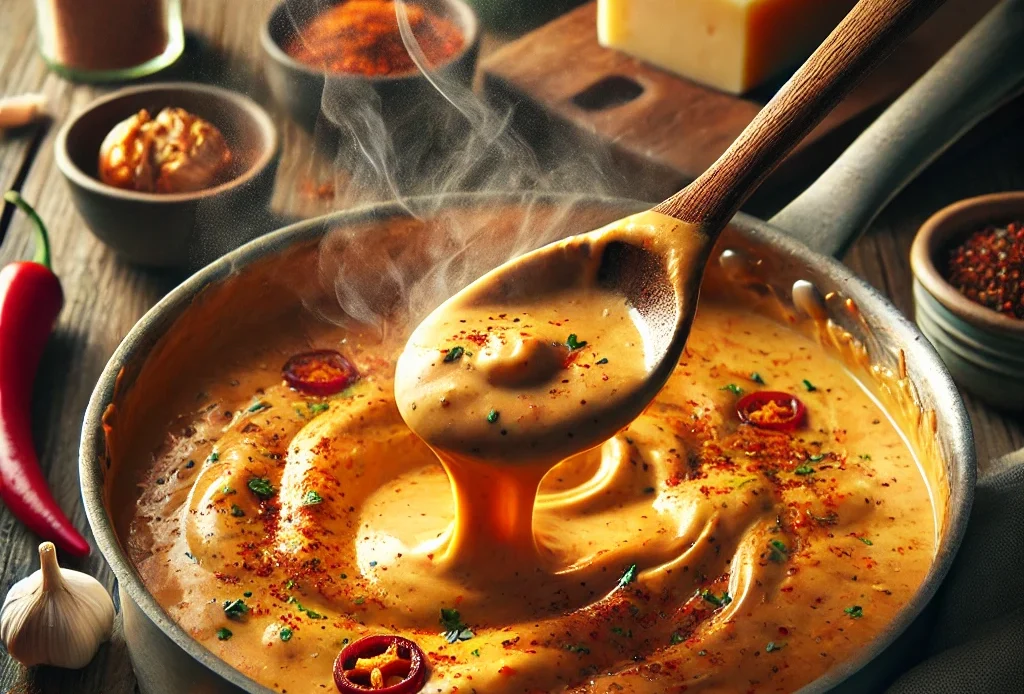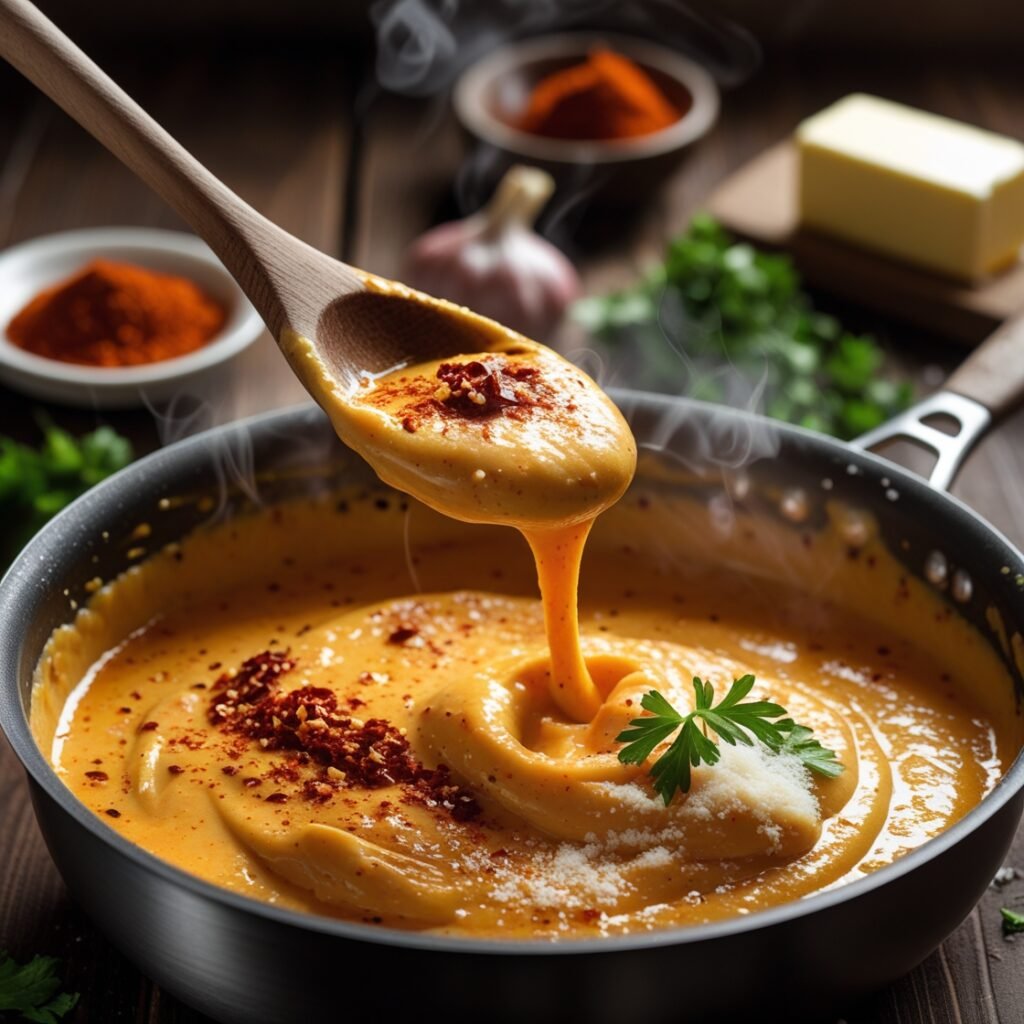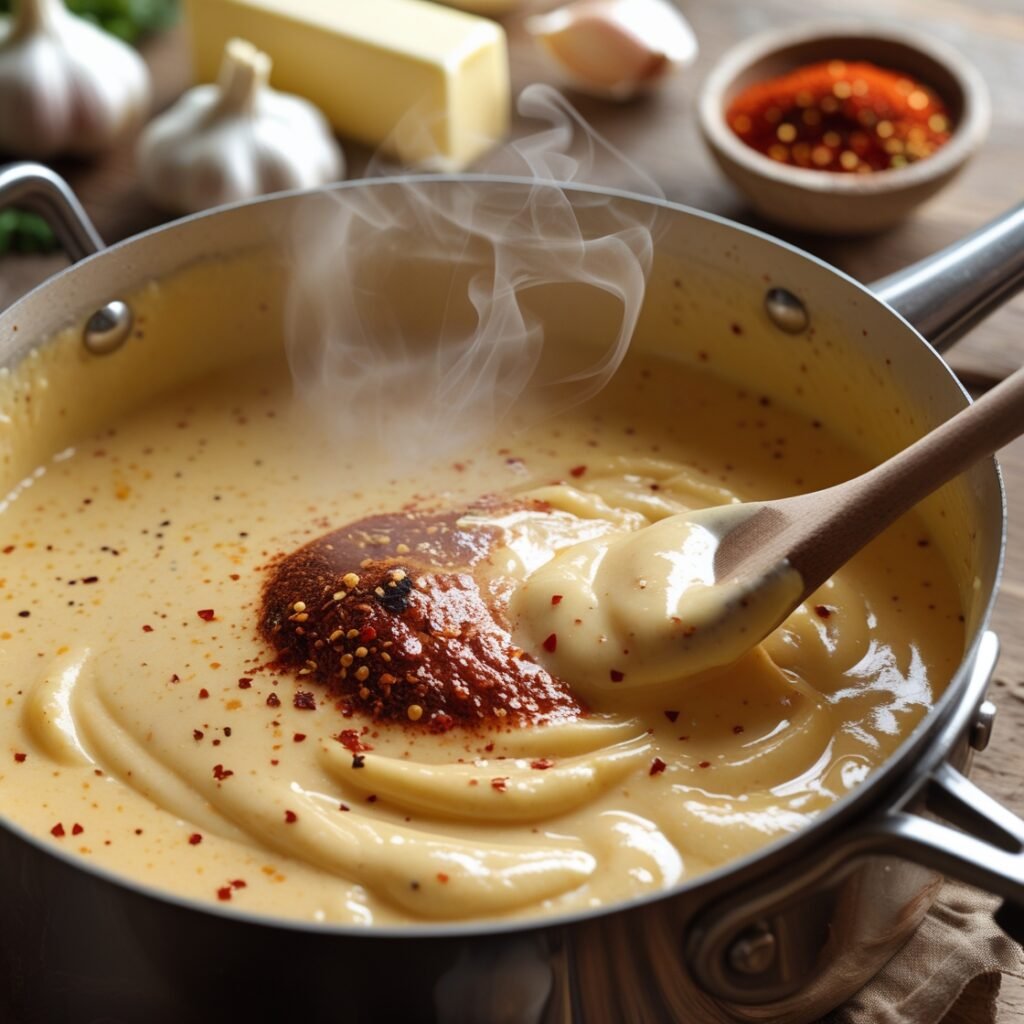
Ever wondered if Alfredo’s rich, buttery taste can handle Cajun’s bold heat? Find out how cajun alfredo sauce mixes Italian creaminess with Louisiana spice. It’s a dish that’s both cozy and exciting. This spicy alfredo sauce is more than a twist—it’s a flavor breakthrough.
If you love pasta and want something new, or if you’re into spice and looking for balance, this guide is for you. You’ll learn to make a sauce that’s bold yet smooth. No need to choose between heat and texture here.
Key Takeaways
- Learn how Italian and Cajun flavors unite in one sauce.
- Get step-by-step tips for balancing heat and creaminess.
- Discover easy swaps to customize your spicy alfredo sauce for any palate.
- Find out why real Cajun seasoning makes this recipe stand out.
- See how to use the sauce beyond pasta—think dips, bowls, or even soups.

The Origins and Appeal of Cajun Alfredo Sauce
Every plate of cajun pasta alfredo has a story. It mixes Italian Alfredo’s creamy richness with Louisiana’s Cajun spice. This blend has become a modern favorite.
The Fusion of Italian and Cajun Cuisines
Italian Alfredo sauce comes from Rome, made with cream, butter, and Parmesan. Cajun cooking, from Louisiana’s bayous, uses bold spices like paprika and cayenne. Together, they make cajun alfredo sauce, a mix of comfort and heat. It’s loved by chefs and home cooks, showing how different flavors can come together.
Why Cajun Seasoning Elevates Traditional Alfredo
Cajun spices turn simple Alfredo into something special. The key spices are:
- Paprika for smokiness
- Cayenne pepper for heat
- Garlic and onion powder for depth
These spices add flavor without being too much. The result is a dish that’s both comforting and exciting.
The Growing Popularity of Cajun Alfredo in American Cuisine
What was once a special dish is now found everywhere. Food blogs and social media have helped it grow. It’s loved for its ability to pair with many foods, from shrimp to ziti. Its flexibility makes it perfect for any meal.
Essential Ingredients for Authentic Cajun Alfredo Sauce
Every part of your cajun alfredo sauce is important. It balances richness, heat, and depth. Start with heavy cream and butter for a velvety texture. Grated Parmesan cheese adds salty umami. A homemade or quality Cajun seasoning blend gives the sauce its spicy kick.
- Heavy cream: Thickens the sauce and creates creaminess
- Unsalted butter: Adds richness and acts as a flavor carrier
- Parmesan cheese: Use freshly grated to avoid gritty texture
- Cajun seasoning blend: Must include paprika, cayenne, thyme, and garlic powder
| Key Spice | Flavor Contribution |
|---|---|
| Paprika | Smoky undertones |
| Cayenne | Adjustable heat for spicy alfredo sauce |
| Thyme | Earthy herbal notes |
| Garlic powder | Deep umami base |
Optional ingredients like minced garlic or diced bell peppers add complexity. If Parmesan is hard to find, try Pecorino Romano cheese. Always use real butter—it makes the sauce richer. Adjust the cayenne to your taste, but don’t skip paprika. It’s key to the authentic Cajun flavor.
Kitchen Tools You’ll Need for Perfect Results
Mastering cajun alfredo sauce requires the right tools for texture and flavor. Each tool helps turn ingredients into a dish fit for a restaurant. Here’s what you need before starting.
Basic Equipment for Sauce Making
- Heavy-bottomed saucepan: It spreads heat evenly to avoid scorching. Choose 3- to 4-quart sizes for the right reduction.
- Stainless steel whisk: It breaks down ingredients smoothly, preventing lumps in your cajun alfredo sauce.
- Wooden spoon: It’s safe for non-stick pans and stirs the sauce without scratching.
Optional Tools for Advanced Techniques
Consider these extras to enhance your process:
- Immersion blender: It smooths out any grittiness from spices in your cajun chicken alfredo recipe.
- Digital thermometer: It keeps an eye on temperature to prevent cheese from curdling at high heats.
- Spice infusion bag: Steeps dried herbs like thyme or paprika without leaving bits in the sauce.
Measuring for Precise Spice Balance
| Tool | Why It Matters |
|---|---|
| Metal measuring spoons | Prevents over-measuring cayenne or garlic powder, which can ruin the balance. |
| Kitchen scale | Ensures exact butter and cream ratios for thickening the sauce. |
Exact measurements keep the cajun alfredo sauce spicy but not overpowering.
Preparing Your Workspace and Ingredients Before Cooking
Clear your kitchen counter and arrange tools within reach. A tidy workspace helps you focus on each step. You’ll need bowls, a grater, and a spoon. This setup saves time and reduces errors.
Start prepping ingredients in the order you’ll use them. Grate cheeses finely for smooth melting in your spicy alfredo sauce. Mince garlic and shallots evenly for balanced flavors. If making cajun chicken pasta alfredo, season chicken with Cajun seasoning and let it rest while you make the sauce.
- Measure spices precisely: Use a scale for paprika, cayenne, and cajun blends to avoid over-spicing.
- Chill butter and cream: Cold ingredients blend better, preventing oil separation in the sauce.
- Prep a damp cloth: Wipe cutting boards between chopping vegetables and poultry to avoid cross-contamination.
Wear disposable gloves when handling hot spices to protect your hands. Keep dairy items like cream cool until needed. Marinate chicken in the fridge if prepping ahead, keeping it sealed and dated.
Test your spice mix on a small pasta sample before adding to the full batch. This ensures your spicy alfredo sauce is just right. Prep vegetables like bell peppers or onions in uniform pieces for even cooking in the final dish.
Step-by-Step Instructions for Making Cajun Alfredo Sauce
Learning to make cajun alfredo sauce is all about following the right steps. This guide will help you create a smooth base and add bold Cajun flavors to your pasta.
Creating the Cream Base
Melt unsalted butter in a saucepan over medium heat. Slowly whisk in heavy cream and simmer until small bubbles form at the edges. This thickens the base without scorching. Stir constantly to prevent separation.
The goal is a glossy, slightly reduced liquid ready for seasoning.
Incorporating the Cajun Seasonings
Whisk in cajun seasoning once the cream base simmers. Use a store-bought blend or mix paprika, garlic powder, onion powder, cayenne, and a pinch of thyme. Start with half the blend, then taste and adjust.
Heat the spices gently to bloom their flavors but avoid burning. Stir for 1-2 minutes before moving on.
Achieving Perfect Consistency
Reduce heat to low. Gradually mix in shredded Parmesan, stirring until melted and smooth. For extra creaminess, add a splash of milk if the sauce thickens too much.
Test consistency by drizzling sauce over a spoon—ideal consistency coats the back of the spoon without dripping.
Adjusting Flavors Before Serving
Season with salt and black pepper to taste. If the cajun pasta alfredo feels too spicy, stir in a teaspoon of lemon juice or a dollop of sour cream. For depth, sprinkle a dash of Worcestershire sauce.
Taste on a piece of bread to ensure heat and salt balance. Refrigerate unused sauce in an airtight container.
Customizing the Spice Level for Your Preference
Adjust the heat in your spicy alfredo sauce to suit your taste. Start with the base recipe, then refine the spice gradually. The cayenne pepper and red pepper flakes in the cajun chicken alfredo recipe control the kick, so add them slowly.
“A little heat goes a long way in creamy sauces. Taste often and adjust.” — Culinary Institute of America

- Begin with ½ teaspoon cayenne. Taste the sauce and add more in ¼ tsp increments.
- Use red pepper flakes as a garnish for optional heat—guests can add their preferred amount.
- Pair with cooling sides like crusty bread or a sprinkle of Parmesan to balance intensity.
For a cajun chicken alfredo recipe, serve lemon wedges or a dollop of sour cream on the side. These elements neutralize heat without masking the sauce’s richness. If the sauce becomes too hot, stir in a bit of cream to dilute. Remember, spices like smoked paprika add depth without extra heat—use them to enhance flavor before adding more chili.
Delicious Variations of Your Cajun Alfredo Sauce
Explore new flavors with your cajun chicken alfredo recipe. Try bold proteins, lighter options, or plant-based dishes. Each twist makes your meal exciting and fresh.
Cajun Chicken Pasta Alfredo
For a hearty cajun chicken pasta alfredo, add protein-rich chicken. Here’s how to do it right:
- Season chicken: Coat breasts or strips with cajun seasoning before cooking.
- Cooking methods: Sauté until golden, or grill for smoky depth. Blackening adds crispy texture.
- Combine: Toss cooked chicken with alfredo sauce and pasta for a dish packed with heat and creaminess.
Seafood Options
Make your dish special with seafood. Follow this guide to avoid overcooking:
| Seafood | Cooking Time |
|---|---|
| Shrimp | 2-3 minutes (peeled and deveined) |
| Crawfish tails | 4-5 minutes (thawed if frozen) |
| Mixed seafood medley | 3-4 minutes (combine after sauce thickens) |
Vegetarian/Vegan Adaptations
Replace dairy with non-dairy options:
- Cashew cream: Soak cashews, blend with water, and simmer to thicken.
- Cauliflower puree: Roast cauliflower, blend smooth, and mix into sauce base.
- Add protein with tofu, chickpeas, or roasted zucchini.
Lower-Calorie Modifications
Reduce calories without losing flavor:
- Replace ½ the cream with low-fat Greek yogurt or almond milk.
- Use spiralized zucchini or shirataki noodles instead of pasta.
- Serve sauce on the side to control portions.
Storing and Reheating Your Homemade Sauce
Keeping your cajun alfredo sauce fresh is easy. Cool it down first, then put it in airtight containers. Store it in the fridge for up to 4 days or freeze for 2-3 months. Always label containers with the date.
- Refrigeration: Choose glass or BPA-free plastic containers. Make sure to leave 1 inch of space for expansion when freezing.
- Freezing: Freeze in single servings to thaw only what you need. Freezing at 0°F (-18°C) helps prevent ice crystals.
When reheating, be gentle to keep the sauce smooth and flavorful. For cajun pasta alfredo, avoid high heat to prevent dairy from curdling:
- Stovetop: Heat the sauce slowly over low heat, stirring often. If it’s too thick, add a bit of milk.
- Microwave: Heat in 30-second bursts, stirring between each interval. Use a microwave-safe bowl with a loose lid or vented cover.
- Double Boiler: To fix separated sauces, melt them over simmering water. Whisk in butter to make it creamy again.
If your sauce gets too thick, thin it with warm broth or cream. Before serving, taste it and adjust the spice if needed. If it smells bad or has mold, throw it away.
Pairing Suggestions for Your Cajun Alfredo Creation
Make your cajun pasta alfredo even better with the right pairings. These choices balance its bold flavors. They ensure every part of your meal is a hit.
Pasta Shapes That Work Best
- Fettuccine and linguine keep sauce in their strands. Penne holds it in ridges.
- Stay away from delicate pastas like angel hair. They get lost in the sauce’s richness.
- Don’t overcook pasta. Cook it al dente so it absorbs the sauce without getting soggy.
Complementary Side Dishes
Choose sides that contrast the sauce’s creaminess and spice:
- Garlic green beans or roasted asparagus add a fresh crunch.
- A citrusy arugula salad with vinaigrette cuts through the richness.
- Garlic bread or cornbread offer a savory contrast.
- For lighter options, try roasted sweet potatoes or a quinoa salad.
Beverage Pairings for a Complete Meal
Match your cajun chicken alfredo recipe with drinks that highlight its boldness:
- Off-dry Riesling or Zinfandel wine: acidity and fruit notes balance the heat.
- IPA beer: hop bitterness contrasts the spice.
- Non-alcoholic: sparkling water with lime or a spicy ginger ale.
- Cocktails: Try a “Cajun Paloma” with tequila, lime, and Tajin seasoning for a spicy-sweet twist.
Nutritional Information and Dietary Considerations
Knowing the nutritional facts of cajun alfredo sauce lets you enjoy it wisely. A ¼-cup serving has about 300–350 calories. Most of these calories come from heavy cream and cheese. Dairy provides the protein, while carbs come from milk solids and optional garlic bread crumbs.
- Fats: Butter and cream make it rich. Choose 2% milk instead of whole to cut down on saturated fats.
- Sodium: A single serving might have 400–500mg sodium. Use low-sodium broth or skip pre-seasoned Cajun blends to reduce it.
- Allergens: Traditional recipes include dairy and spices. For nut-free or vegan diets, use cashew-based sauces and ensure spices are allergen-free.
Those avoiding dairy can make a spicy alfredo sauce with coconut milk and nutritional yeast. Lactose-intolerant cooks can use lactose-free cheese or add probiotic-rich kimchi for tang. Always check labels for cross-contact risks if gluten-free, as many spice mixes contain wheat starch.
“Balance indulgence by pairing cajun alfredo sauce with fiber-rich veggies like zucchini noodles or roasted broccoli,” advises registered dietitian Sarah Thompson.
Adjust portions to fit your goals: a half-cup serving halves calories. Track capsaicin intake if sensitive—reduce cayenne or use mild paprika. Always consult nutrition labels for exact values, as homemade recipes vary widely.
Troubleshooting Common Issues with Spicy Alfredo Sauces
Getting the perfect cajun alfredo sauce means knowing how to fix common mistakes. Even experienced cooks can face problems like separated sauces, too much heat, or a thin texture. Here’s how to solve each issue:
Fixing a Broken or Separated Sauce
If your cajun alfredo sauce separates:
- Add 1-2 tbsp cold cream while whisking constantly.
- For a starch slurry fix, mix 1 tsp cornstarch with cold water and stir slowly.
- Remove from heat and gradually reintroduce warm sauce to the broken mixture.
Adjusting an Overly Spicy Sauce
Got a cajun chicken pasta alfredo that’s too hot? Try these fixes:
- Dilute: Stir in ¼ cup milk or cream.
- Balance: Add a pinch of sugar or a splash of lemon juice.
- Mask: Stir in more butter or Parmesan to dilute heat intensity.
Thickening a Runny Cajun Alfredo
Here are some ways to thicken your sauce:
| Method | Steps | Tips |
|---|---|---|
| Reduction | Simmer uncovered until thickened | Stir often to avoid scorching |
| Roux Thickener | Melt 1 tbsp butter + 1 tbsp flour, cook 2 minutes, mix into sauce | Works best for cajun chicken pasta alfredo with added proteins |
| Cheese Boost | Add ¼ cup grated Parmesan off heat | Use sharp cheeses for faster thickening |
To avoid future problems, keep an eye on the heat and seasonings. Always taste before serving to make sure it’s just right.
Conclusion: Mastering the Art of Cajun Alfredo Sauce
Mastering cajun pasta alfredo is all about finding the right mix of cream, spice, and heat. Every detail, from picking fresh ingredients to tweaking the seasoning, makes a difference. Pay attention to techniques like tempering spices and getting the sauce just right.
Try new things with your cajun chicken alfredo recipe. Experiment with different spice mixes or add shrimp. Adjust the flavors to your liking and think about what to serve with it, like garlic bread or veggies. Don’t forget to make it look good too—add herbs or chili flakes for a pop of color and flavor.
Cajun pasta alfredo is a true blend of Italian and Cajun flavors. As you get better at making it, remember that practice is key. Whether it’s for a quick dinner or a special occasion, this dish is a canvas for your creativity. Try out different seasonings, use seasonal ingredients, or make it healthier to keep your dishes exciting.
FAQ
What is Cajun Alfredo Sauce?
Cajun Alfredo Sauce is a mix of Italian Alfredo sauce and Cajun spices. It has a creamy base with spices like paprika, cayenne, and garlic. This makes it great for pasta dishes.
Can I make a milder version of Cajun Chicken Alfredo?
Yes, you can make it milder. Start with less cayenne and paprika. Add more to taste. You can also add cream or cheese to cool it down.
What pasta shapes work best with Cajun Chicken Pasta Alfredo?
Shapes like fettuccine, linguine, and penne are best. They stick well to the creamy sauce.
How can I store leftover Cajun Alfredo sauce?
Cool it quickly and put it in an airtight container. It lasts up to 3 days in the fridge. Freeze it for longer, but dairy sauces might separate.
Can I make Cajun Alfredo sauce vegan?
Yes! Use plant-based options like cashew cream or coconut milk. Nutritional yeast can replace cheese for a similar taste.
How can I fix a broken or separated Cajun Alfredo sauce?
If it separates, whisk in cold cream or milk over low heat. Adding a starch slurry or blending can also fix it.
What can I serve with Cajun Pasta Alfredo?
Pair it with garlic bread, a light salad, or roasted veggies. These sides balance the sauce’s richness.
What types of cheese work best in Cajun Alfredo?
Parmesan is traditional, but try Romano or Gouda for different tastes. Make sure they melt well for creaminess.
How do I adjust the flavors of my Cajun Alfredo before serving?
Taste it before serving. Add salt, cream, or lemon juice to balance the flavors. This ensures it tastes just right to you.
What’s the difference between Cajun Alfredo and regular Alfredo?
Cajun Alfredo has Cajun spices for bold flavors and heat. Regular Alfredo is just cream, butter, and cheese, simpler and less spicy.




